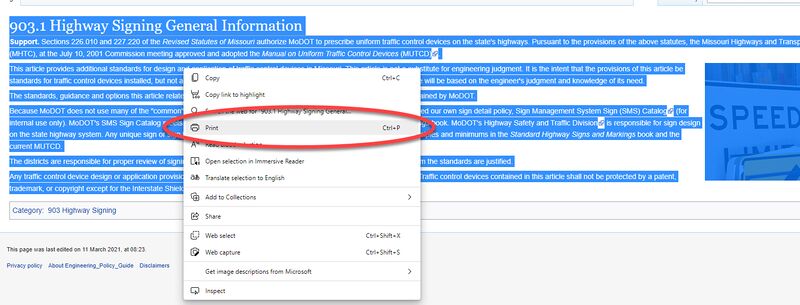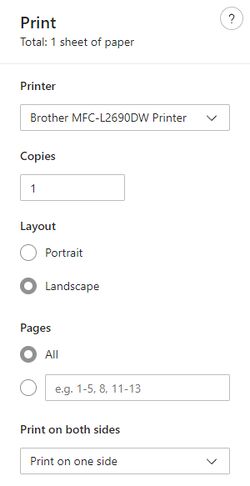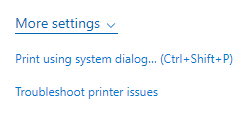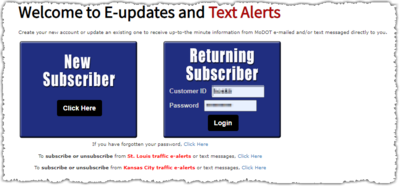Help Article: Difference between revisions
m →EPS Ballot Cycles: updated |
m →Signing Up for E-Updates: updated eupdates hyperlink |
||
| Line 39: | Line 39: | ||
==Signing Up for E-Updates== | ==Signing Up for E-Updates== | ||
To Sign up for the Engineering Policy Guide E-updates [https:// | To Sign up for the Engineering Policy Guide E-updates [https://modotweb.modot.mo.gov/eUpdatesPublic CLICK HERE]. | ||
1) Either select New Subscriber or Returning Subscriber. | 1) Either select New Subscriber or Returning Subscriber. | ||
Revision as of 11:59, 23 July 2024
The Engineering Policy Guide (EPG) contains MoDOT policy, procedure and guidance for the planning, design, construction and maintenance of roadway and related facilities. It also includes specific technical topics of right of way, bridge, traffic and materials. These articles are numbered to reflect as closely as possible the pay items and divisions from Missouri Standard Specifications for Highway Construction.
The EPG is not a contract document and EPG articles are referenced as EPG XXX.X or "articles" - not "sections" - to avoid confusion with MoDOT specifications. Where a conflict exists between the EPG and a contract, the contract document rules. References and links to the Missouri Standard Specifications are given as "Sec XXX.XX" or "Section XXX.XX of the Standard Specifications." References and links to the Missouri Standard Plans for Highway Construction are "Standard Plan XXX.XX".
Organization
Articles are grouped into the specification book’s divisions (for example, the EPG articles in EPG 100 General mirror Division 100 specifications, articles in EPG 300 Bases mirror Division 300 specifications, etc.). Many articles have been subdivided into additional articles. For example, the reader may notice that EPG 903.6 Warning Signs and other EPG 903 articles are listed at the bottom of EPG 903 Highway Signing.
While every effort has been made to base the article numbers on MoDOT pay items and specifications, not all articles in the EPG are reflected in the pay items and specifications. For example, many EPG “100 General” articles are important to the design and construction of roadway facilities but do not directly correspond to specific pay items. Some of these are:
Similar examples are to be found in the EPG 200, EPG 300, etc. articles.
How to Easily Select and Print an Entire Article or a Portion of an Article Using Microsoft Edge
- 1) Highlight the selected article or portion of article
- 2) Right-click on the select text and select Print (You can also use the shortcut Ctrl+P)
- 3) Change your print options as needed
- 4) Should your selection include a large table or figure that creates an undesirable appearance, you can select More settings to change your paper size or change the scale of your print
- 5) Once you have selected your settings just select the Print Button
Signing Up for E-Updates
To Sign up for the Engineering Policy Guide E-updates CLICK HERE.
1) Either select New Subscriber or Returning Subscriber.
2) If you are a New Subscriber you will need to fill out all the account information.
3) Make sure you select how you want to receive the updates.
4) Scroll down towards the bottom to the Engineering Policy Section and check the box that says Engineering Policy Guide (EPG).
5) Check any other items you would like to receive E-updates on. Once you are done select Submit at the bottom of the page.
EPS Approval Process
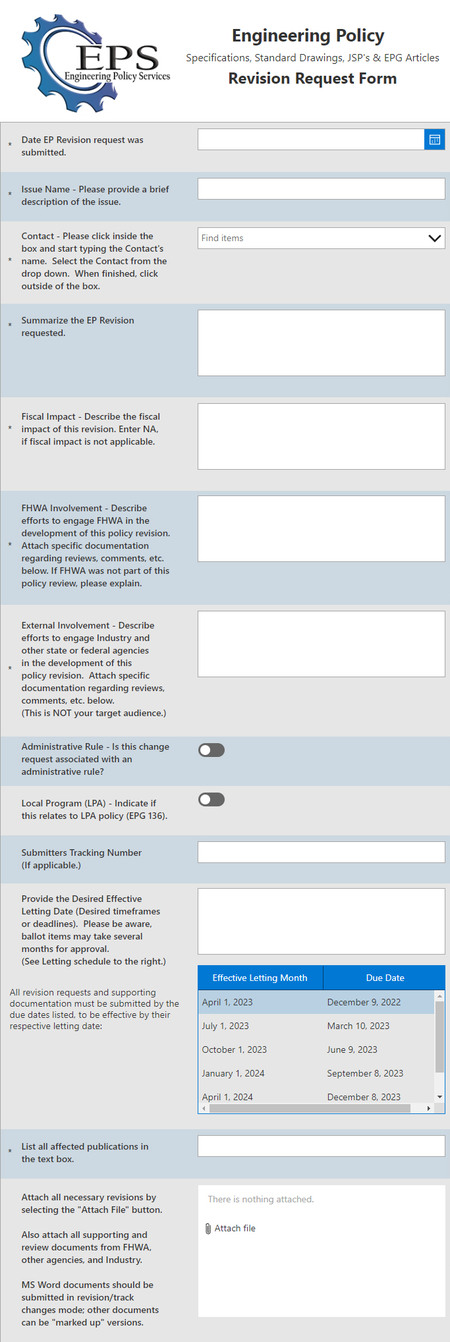
Revisions to engineering policy are proposed using the Engineering Policy Revision Request Form. Revisions to forms used in the EPG are also proposed by using the Engineering Policy Revision Request Form.
Any other policy affected by a proposed EPS revision?
Provide electronic files of all the revisions to other MoDOT policies (other EPG articles, any Standard Plans, Specifications, JSPs, etc.) impacted by the EPG proposal. Word files in revision mode are required for textual changes. Dgn files are preferred for Standard Plan revisions although a redlined hard copy showing the proposed changes is also acceptable.
Completing the Engineering Policy Revision Request Form
Every proposal must document the following:
- Date - Enter the date you are submitting your request.
- Issue Name - Please provide a brief description of the issue.
- Contact - The name of the sponsor(s) from within the division submitting the revision request is required.
- Summary Provide the reason why the proposed revision(s) is necessary or its benefit to the Department. This will help with the approval process.
- Fiscal Impact - Provide a dollar estimate for the proposal’s costs or savings to MoDOT. Include necessary calculations (initial savings or life cycle savings, for example) or assertions to accurately convey the proposal’s financial impact. The fiscal impact should be a numeric dollar value.
- FHWA Involvement - FHWA should be involved with major policy revisions. Describe efforts to engage FHWA in the development of this policy revision. Attach specific documentation regarding reviews, comments, etc. below. If FHWA was not part of this policy review, please explain why not.
- External Involvement - Provide a summary of efforts undertaken during the development of the item to engage affected industry groups and the FHWA. Provide specific examples of who was involved and how the involvement occurred. This is not applicable to every submittal, but is critical for the determination of the associated approval level for borderline items.
- Administrative Rule - Select if this revision request is associated with an administrative rule. (optional)
- Local Program (LPA) - Indicate if this relates to LPA policy (EPG 136). (optional)
- Tracking Number - (optional)
- Desired Effective Date - Provide the Desired Effective Letting Date (Desired timeframes or deadlines). Please be aware, ballot items may take several months for approval. (optional)
- Affected Publications - Should a proposal for EPG 606.1 also require revisions to Sec 606 and Std. Plan 606.30, the section and standard plan as well as their proposed revisions would be specified along with the proposed revisions to the EPG article.
- Attachments - Attach all necessary revisions by selecting the "Attach File" button. Also attach all supporting and review documents from FHWA, other agencies, and Industry. MS Word documents should be submitted in revision/track changes mode; other documents can be "marked up" versions.
After the proposed EPS revision is submitted
| Tips on Text |
| While Engineering Policy Services edits all submittals, a few grammatical guidelines include: |
| Assure/Ensure/Insure: The word “assure” is a personal guarantee based on reputation. “Ensure” is used when the party is to make certain of something or to be careful. “Insure” refers to actions protected by insurance, and indicates that money is involved. |
| Dimensions: Typically use “high”, “wide” and “long” instead of “in height”, “in width” and “in length”. |
| Farther/Further: Use “farther” to express a physical distance, such as 10 miles farther, and “further” for a non-physical dimension, such as further thought. |
| Fewer/less: Use “few” or “fewer” for something comprised of a small number of countable components (such as fewer dollars, fewer gallons of water, etc.). Use “less” for amounts that are not being counted (less money, less water, etc.). |
| Gender: Minimize the use of “he/she”, “he and she” and “she or he”. |
| High/Tall: Use “high” to express a lofty position, such as the clouds are high. Use “tall” to express a great vertical dimension, such as the tall post. |
| Until: Do not use "til". |
Submittals are evaluated and processed on a quarterly schedule. Final decisions on proposed ballots are submitted to the Policy and Innovations Engineer for disposition. The Assistant Chief Engineer submits the final decision on Level 2 revisions and the Chief Engineer submits the final decision on Level 3 revisions. Proposed revisions will be categorized by the Policy and Innovations Engineer based on the following guidelines:
Level 1 Approval. If, upon submittal in the Engineering Policy Revision Request Form, a proposed revision is determined to be a routine technical matter, an errata correction or a clarification, it can be approved by the Policy and Innovations Engineer without comment from the district engineers, the division engineers or the Chief Engineer. The EPG will be revised as necessary.
Level 2 Approval. If, upon submittal in the Engineering Policy Revision Request Form, a proposed revision is determined to be a moderate technical change, if it requires specific expertise (e.g. structural design, etc.) or if it impacts more than one division, the proposal is processed as a Level 2 Ballot item. The District Engineers and Division Directors/Engineers are provided 10 business days to provide their comments to the Assistant Chief Engineer who will consider the idea before providing a decision to the Policy and Innovations Engineer. The Federal Highway Administration is given 10 working days to provide comment or concurrence with the Policy and Innovations Engineer. Upon approval any associated documents and the EPG will be revised as necessary.
Level 3 Approval. If, upon submittal in the Engineering Policy Revision Request Form, a proposed revision is determined to be a complex technical change, contentious, has high cost or impacts MoDOT's external conduct of business, the proposal is processed as a Level 3 Ballot item. The District Engineers and select Division Directors/Engineers are provided 10 business days to provide their comments to the Chief Engineer who will consider the idea before providing their decision to the Policy and Innovations Engineer. The Federal Highway Administration is provided 10 business days to provide comment or concur with the proposal. Upon approval, any associated documents and the EPG will be revised as necessary.
Changes to the Standard Specification, Standard Drawings and Pay Items are documented by Design Standards Letters.
EPS Ballot Cycles
| Engineering Policy Services Ballot Schedule | |||
|---|---|---|---|
| Revision Requests Due | Ballot Items Due | Publish Revisions | Effective Date |
| March 7, 2024 | March 20, 2024 | April 22, 2024 | July 1, 2024 |
| June 6, 2024 | June 20, 2024 | July 22, 2024 | October 1, 2024 |
| September 5, 2024 | September 18, 2024 | October 21, 2024 | January 1, 2025 |
| December 5, 2024 | December 17, 2024 | January 21, 2025 | April 1, 2025 |
| March 6, 2025 | March 18, 2025 | April 21, 2025 | July 1, 2025 |
| June 5, 2025 | June 17, 2025 | July 21, 2025 | October 1, 2025 |
| September 4, 2025 | September 16, 2025 | October 20, 2025 | January 1, 2026 |
Division Contacts
Since the divisions provide authoritative input, consulting with their liaisons or contacts may provide the help you require or receive your input. Below is a listing of divisional personnel with whom the Engineering Policy staff works and who may be helpful to you:
- Bridge: Darren Kemna
- Chief Counsel's Office: Terri Parker
- Construction and Materials:
- Chemical Laboratory: Todd Bennett
- Construction Engineering: Dennis Brucks, Niall Jansson, Jason Blomberg
- Geotechnical Engineering: Lydia Brownell
- Physical Laboratory: Brett Trautman
- Design: Laura Ellen, Jennifer Becker, Dave Simmons, Randall Glaser
- Bid & Contract Services: Danica Stovall-Taylor
- CADD Services: Steve Atkinson
- Environmental Compliance: Melissa Scheperle
- Historic Preservation: Rachel Campbell
- LPA: Laura Ellen
- Right of Way: Mendy Sundermeyer, Greg Wood
- Highway Safety & Traffic: Katy Harlan
- Safety Engineering: Katy Harlan
- Signals: Ray Shank
- Signs: Tom Honich, Cayci Reinkemeyer
- Work Zones: Dan Smith
- Maintenance: Paul Denkler
- Multimodal: Jerica Holtsclaw
- Aviation: Kyle LePage
- Freight & Waterways: Levi Woods
- Railroads: Troy Hughes
- Transit: Christy Evers
- Planning: Llans Taylor
FHWA Contacts
Below is a listing of FHWA personnel with whom the Engineering Policy staff works and who may be helpful to you:
- ADA: Lauren Paulwell
- Bridge: Scott Stotlemeyer
- Construction and Materials: Félix González
- Design: Brian Nevins (NE), Kevin Irving (KC & NW), Félix González (SL), Charles Pursley (CD, SE & SW)
- Environmental: Rebecca Rost and Taylor Peters
- Pavements: Félix González
- Right of Way: Lauren Paulwell
- Safety and Traffic Control: John Miller
- Transportation and Planning: Cecelie Cochran and Daniel Weitkamp

